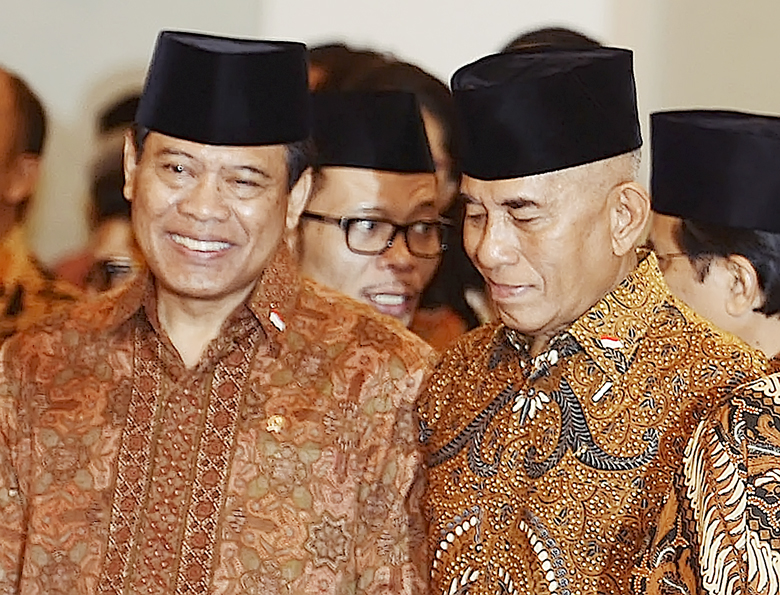Top Priority: The new president appears to be sending out the message that he takes national security very seriously, but only time will tell how effective he proves
By Bantarto Bandoro on 08:20 am Oct 28, 2014
http://thejakartaglobe.beritasatu.com/opinion/jokowi-cant-complacent-security-issues/

Tedjo Edi Purdjiatno, left, the chief security minister, and Ryamizard Ryacudu, right, the defense minister. (Antara Photo/Prasetyo Utomo)
Unlike previous presidents, Joko Widodo called his top national security figures to gather at the State Palace less than a week into his administration, suggesting that national security matters are too important to be ignored.
Every angle of national security was represented by the presence of all top security officials, reflecting the fact that national security in Indonesia depends on how comprehensively the government perceives the concept of national security and how it executes the concept.
President Joko, unlike his predecessor, Susilo Bambang Yudhoyono, a former military man, is presumed to have little grasp of national security. Thus his decision to have the top security officials gathered at the palace was meant to tell the public of his commitment and concerns about the importance of Indonesia’s national security, at least for the next five years.
The coming period under Joko will be a crucial time for the country, given the seemingly unaddressed security issues left by the Yudhoyono administration.
For Indonesia, national security is not only about threats to the country’s sovereignty and well-being, but also refers to those aspects that correlate, directly or indirectly, to national security, such as weapons modernization, defense spending, professionalism of armed forces personnel, communal conflicts, terrorism threats, land ownership conflicts, and so on.
Perhaps one of the most daunting security challenges Joko will have to address is whether he can convince the new members of the House of Representatives of the importance of the national security bill, which has yet to be passed by the House.
Assuming that the bill is passed, Joko will have strong legal grounds to execute policies that he thinks are necessary to uphold national security, regardless of the pros and cons of the bill.
Joko should understand that the concept of national security is a highly complex one that cannot be addressed alone by a single institution.
On the issue of threats arising from the creeping popularity in Indonesia of the Islamic State militant group, for example, the government’s policy to prevent such a movement becoming more far-reaching is not only about effective intelligence, but also needs to be addressed through effective interagency cooperation.
With the presence of top security official at the State Palace, Joko realized that closer cooperation, coordination and sharing of information between security institutions are necessary if future and pressing national security issues are to be addressed properly.
As far as the three branches of the Indonesian armed forces are concerned — the Army, Navy and Air Force — the presence of the respective chiefs of staff at the State Palace is assumed to seek assurance from the president that they will get more “bullets” to improve the capabilities of the branches.
The Navy, for example, in line with the presence of the coordinating office for maritime affairs, is expected to play a much more strategic role to protect the vast sea area of Indonesia — but only if the Navy receives from the government much more sophisticated instruments and sufficient funding.
Such a line of thinking can also be applied to the other branches if they are to be seen as capable and more credible in defending their areas of responsibility. The Air Force, for example, needs more surveillance aircraft to constantly monitor the possibility of trouble spots occurring in maritime areas.
Some, if not all, would agree that the improvement in the country’s economic and political situation under the Yudhoyono administration was significant.
But Indonesia, under Joko, will continue to face tremendous security challenges, including an ongoing separatist struggle in Papua, communal conflicts in general, the continuing threat of terrorism, and political conflicts resulting from a tug-of-war between political parties over certain political issues.
Non-traditional security challenges should remain high on Joko’s national security agenda.
By inviting the top security officials to the State Palace, Joko perhaps may have wanted to demonstrate his own approaches, if not specific ones, to pressing national security issues.
What we shall see later on is how successive leaders have understood that national security has to certain extent been shaped by the differences in the issues they each encountered. This means that different imperatives will prompt Joko to act in different ways when handling future national security issues.
But Joko should be reminded that his new approaches to national security, if any, should not be conducted in the absence of the imperative role of those top national security institutions.
Security risks resulting from the effect of the failure to address national security issues promptly will definitely call for broad national security measures to be taken together.
In the end it means that Joko’s government will need to identify security issues accurately and be more effective in addressing them.
The main message of this argument is that President Joko cannot rely too strongly on the security achievements of his predecessor. The still noisy extremism that may lead to violence, the communal conflicts that continue to haunt the country, and the threat of local terrorism — all these are just some of the threats to national security that need to be focused on by President Joko.
Should Joko fail to address this wide spectrum of threats, Indonesia under him risks sliding into domestic turbulence, chaos and conflict. This will in the end erode Joko’s credibility as chief executive of national security. Only time will tell whether Joko has a full grasp on national security issues.
Bantarto Bandoro is a senior lecturer at the Indonesian Defense University’s School of Defense Strategy and a founder of the Institute for Defense and Strategic Studies in Jakarta. He is the author of “Indonesia’s Prescriptions for Regional Security” (2014).
